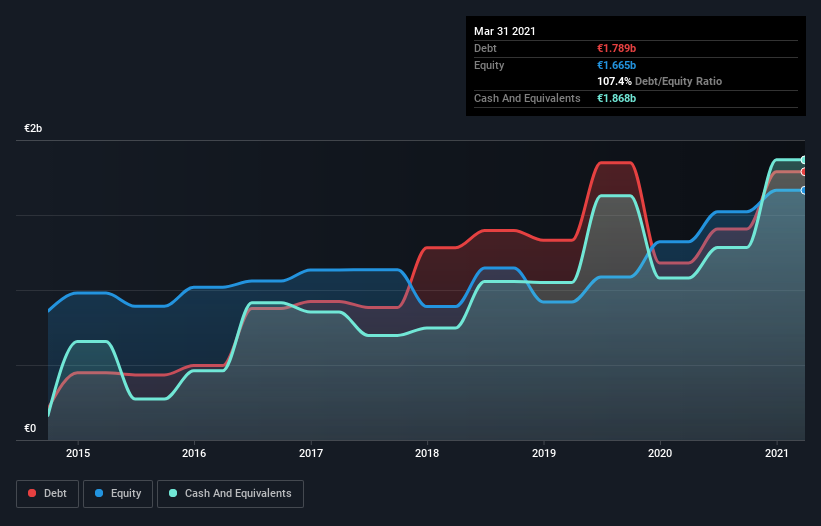
David Iben put it well when he said, 'Volatility is not a risk we care about. What we care about is avoiding the permanent loss of capital.' It's only natural to consider a company's balance sheet when you examine how risky it is, since debt is often involved when a business collapses. We note that Ubisoft Entertainment SA (EPA:UBI) does have debt on its balance sheet. But should shareholders be worried about its use of debt?
Why Does Debt Bring Risk?
Generally speaking, debt only becomes a real problem when a company can't easily pay it off, either by raising capital or with its own cash flow. In the worst case scenario, a company can go bankrupt if it cannot pay its creditors. While that is not too common, we often do see indebted companies permanently diluting shareholders because lenders force them to raise capital at a distressed price. Of course, the upside of debt is that it often represents cheap capital, especially when it replaces dilution in a company with the ability to reinvest at high rates of return. When we think about a company's use of debt, we first look at cash and debt together.
See our latest analysis for Ubisoft Entertainment
What Is Ubisoft Entertainment's Debt?
The image below, which you can click on for greater detail, shows that at March 2021 Ubisoft Entertainment had debt of €1.79b, up from €1.18b in one year. But on the other hand it also has €1.87b in cash, leading to a €79.1m net cash position.

How Strong Is Ubisoft Entertainment's Balance Sheet?
The latest balance sheet data shows that Ubisoft Entertainment had liabilities of €1.11b due within a year, and liabilities of €2.11b falling due after that. On the other hand, it had cash of €1.87b and €605.3m worth of receivables due within a year. So its liabilities total €746.9m more than the combination of its cash and short-term receivables.
Of course, Ubisoft Entertainment has a market capitalization of €6.63b, so these liabilities are probably manageable. However, we do think it is worth keeping an eye on its balance sheet strength, as it may change over time. While it does have liabilities worth noting, Ubisoft Entertainment also has more cash than debt, so we're pretty confident it can manage its debt safely.
Better yet, Ubisoft Entertainment grew its EBIT by 868% last year, which is an impressive improvement. That boost will make it even easier to pay down debt going forward. When analysing debt levels, the balance sheet is the obvious place to start. But it is future earnings, more than anything, that will determine Ubisoft Entertainment's ability to maintain a healthy balance sheet going forward. So if you want to see what the professionals think, you might find this free report on analyst profit forecasts to be interesting.
But our final consideration is also important, because a company cannot pay debt with paper profits; it needs cold hard cash. Ubisoft Entertainment may have net cash on the balance sheet, but it is still interesting to look at how well the business converts its earnings before interest and tax (EBIT) to free cash flow, because that will influence both its need for, and its capacity to manage debt. In the last three years, Ubisoft Entertainment's free cash flow amounted to 40% of its EBIT, less than we'd expect. That weak cash conversion makes it more difficult to handle indebtedness.
Summing up
Although Ubisoft Entertainment's balance sheet isn't particularly strong, due to the total liabilities, it is clearly positive to see that it has net cash of €79.1m. And we liked the look of last year's 868% year-on-year EBIT growth. So we don't think Ubisoft Entertainment's use of debt is risky. There's no doubt that we learn most about debt from the balance sheet. But ultimately, every company can contain risks that exist outside of the balance sheet. For instance, we've identified 2 warning signs for Ubisoft Entertainment that you should be aware of.
If you're interested in investing in businesses that can grow profits without the burden of debt, then check out this free list of growing businesses that have net cash on the balance sheet.
New: AI Stock Screener & Alerts
Our new AI Stock Screener scans the market every day to uncover opportunities.
• Dividend Powerhouses (3%+ Yield)
• Undervalued Small Caps with Insider Buying
• High growth Tech and AI Companies
Or build your own from over 50 metrics.
This article by Simply Wall St is general in nature. We provide commentary based on historical data and analyst forecasts only using an unbiased methodology and our articles are not intended to be financial advice. It does not constitute a recommendation to buy or sell any stock, and does not take account of your objectives, or your financial situation. We aim to bring you long-term focused analysis driven by fundamental data. Note that our analysis may not factor in the latest price-sensitive company announcements or qualitative material. Simply Wall St has no position in any stocks mentioned.
Have feedback on this article? Concerned about the content? Get in touch with us directly. Alternatively, email editorial-team (at) simplywallst.com.
About ENXTPA:UBI
Ubisoft Entertainment
Ubisoft Entertainment SA produce, publishes, and distributes video games for consoles, PC, smartphones, and tablets in both physical and digital formats in Europe, North America, and internationally.
Undervalued with moderate growth potential.

